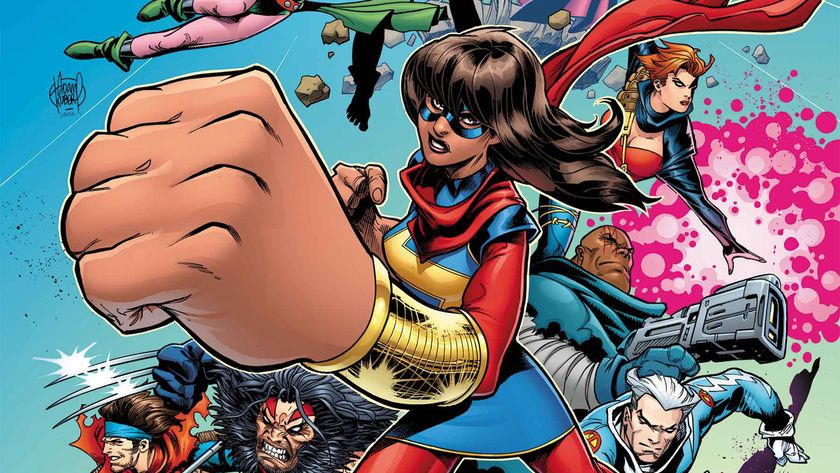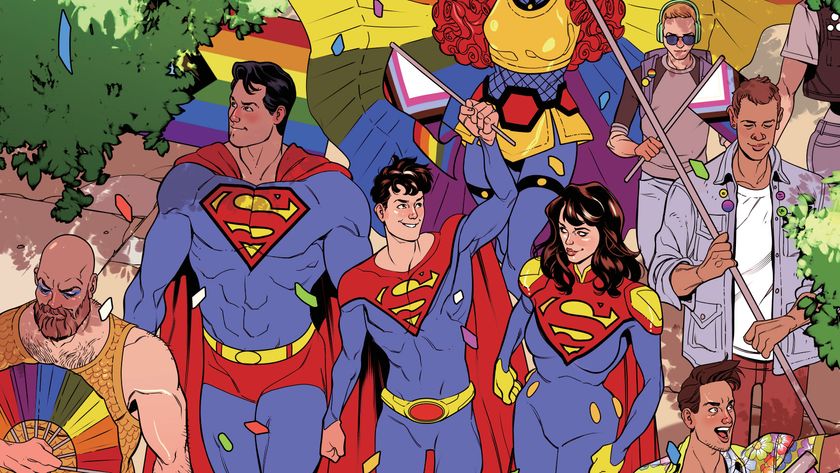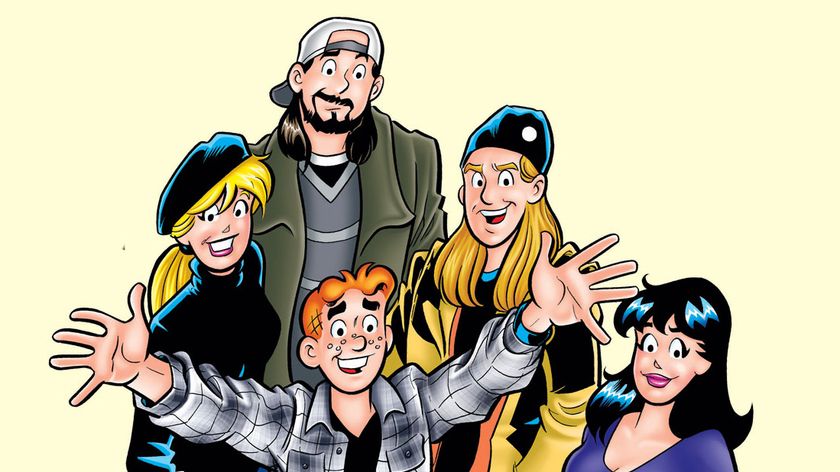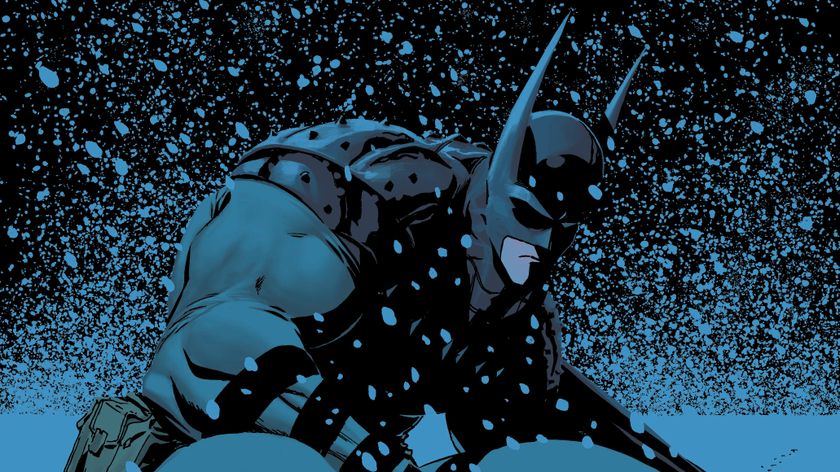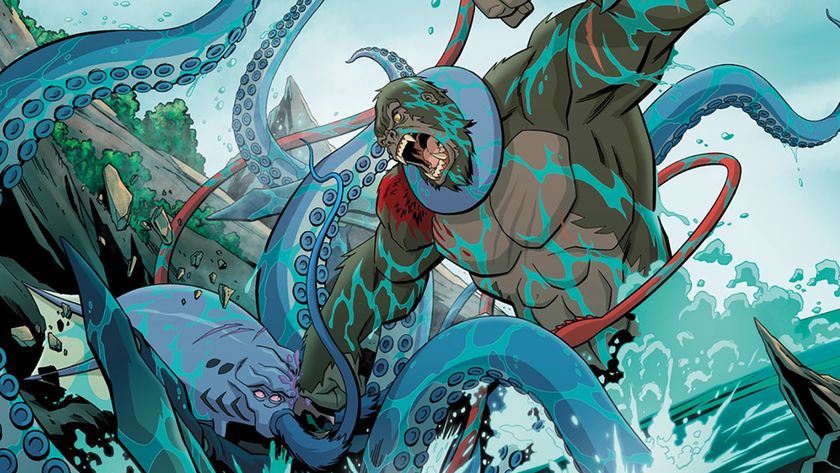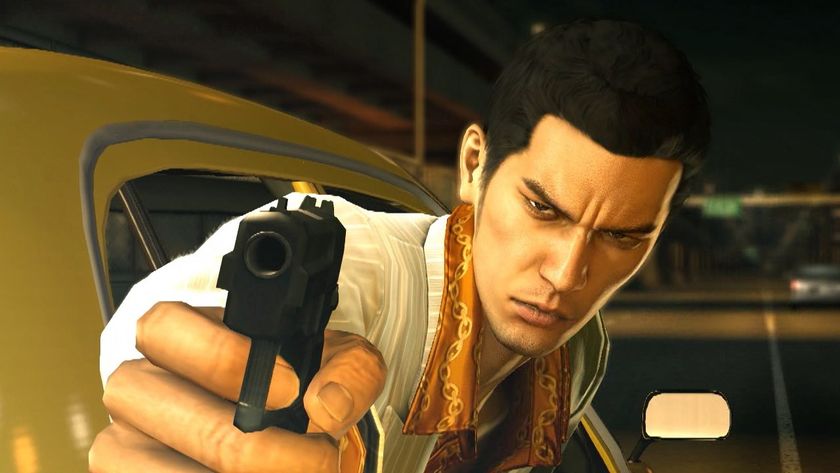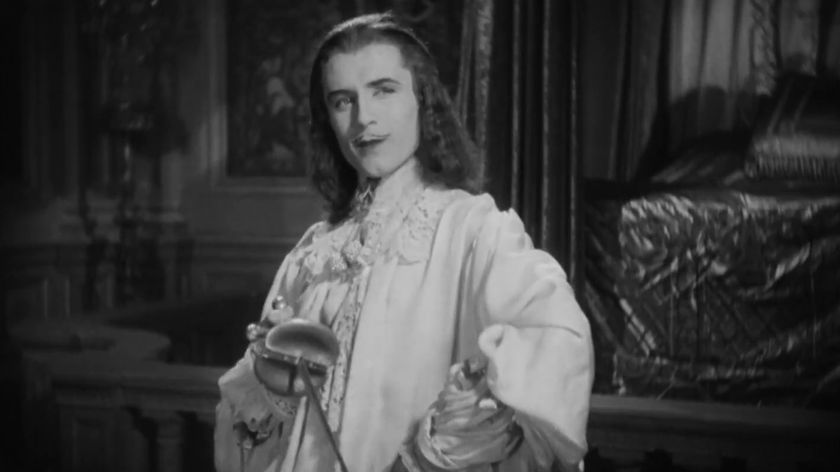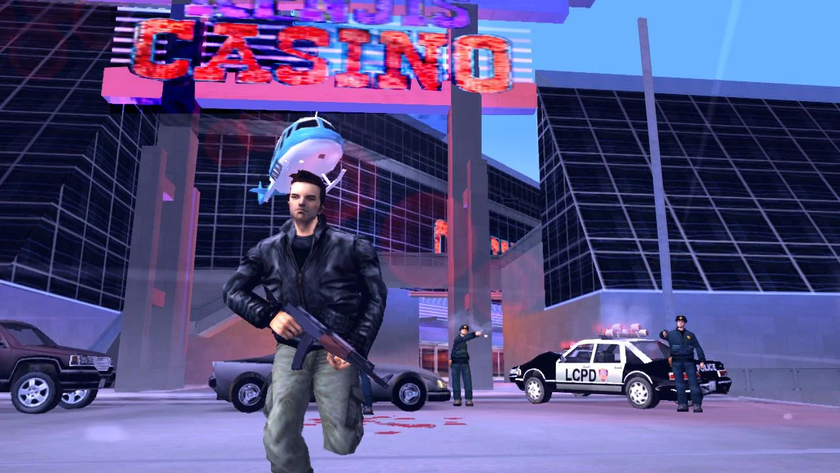Doom Patrol, New Gods, Old Gods, and a Fissure King: The Rachel Pollack Interview
Rachel Pollack looks back on her Doom Patrol run at DC
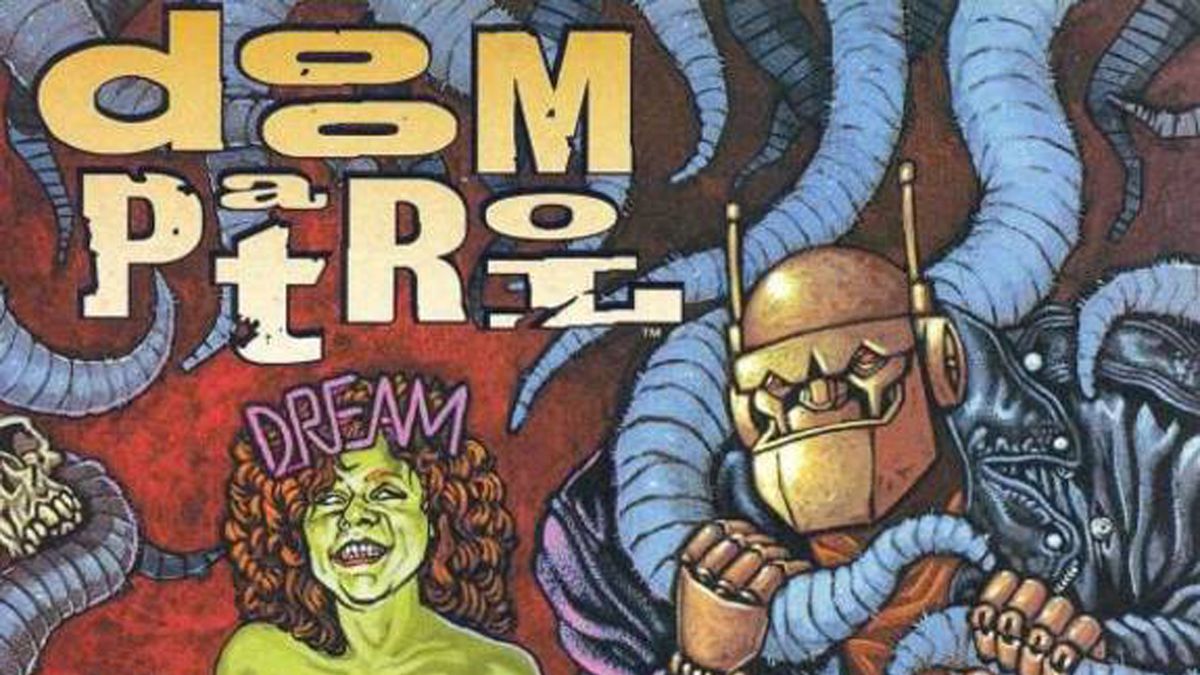
In 1993, Rachel Pollack took over DC/Vertigo's Doom Patrol following Grant Morrison's star-making turn on the book. Her run lasted 25 issues, but has never been collected - but has begun making its way to DC digital platforms recently.
Among the memorable stories is the initial 'Sliding In the Wreckage' arc, as well as the introduction of Kate Godwin (Coagula) - the first trans superhero for DC or Marvel comic books. Over the course of her run, Pollack touched on concepts of family, fitting in, and making a path for yourself in a world that didn't have a set path for you.
Newsarama spoke to Pollack earlier this month about her Doom Patrol run, her prose work such as the new novella collection The Fissure King, and her poised return to comic books.
Newsarama: Rachel, what are you working on today?
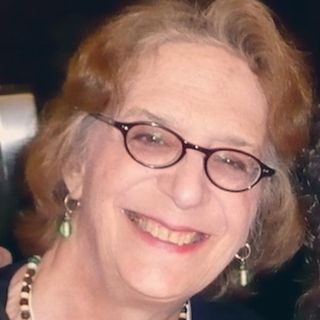
Rachel Pollack: I'm actually typing up a second draft of a story called 'Visible Cities.' I always write everything longhand with fountain pen and then type it up, and that's my second draft. I'm doing that at the moment. And then I'm preparing for a trip to Scotland.
Nrama: I saw that you also have a story coming up in the Mine! anthology with Fyodor Pavlov.
Pollack: Yes! Very excited about that. My story is a mythological story, the current social climate is very political - it's about the Greek seer Teireias, who's famous for being a blind seer, but also for changing sex. My story basically is about Teireias being rescued from the Underworld by Odysseus, and then in the current world - so 2000 years later - Teireias has changed to a woman again and is living in Manhattan. And even though she's blind, she's witnessing the oppression of the gods and human beings. Zeus is kind of a stand-in for Donald Trump.
Comic deals, prizes and latest news
Get the best comic news, insights, opinions, analysis and more!
Nrama: I'm excited to read that, though I wish the anthology was happening under different circumstances.
Pollack: Well, we'll at least do some good in the world, get some attention. Trying to reach a different audience of people than the usual people who are supporting Planned Parenthood.
Nrama: I was excited to see the announcement about that, there were a lot of impressive names involved. How did you get involved with the anthology with Fyodor?
Pollack: Well, one of the editors, Joe Corralo, is kind of my champion. He was a big admirer of my Doom Patrol years ago and has been really helping me reconnect with people and get involved with comics again. We might be doing a project together. But he's made this great effort on my behalf, which is really sweet of him. He invited me to do a story, and that's where it came from.
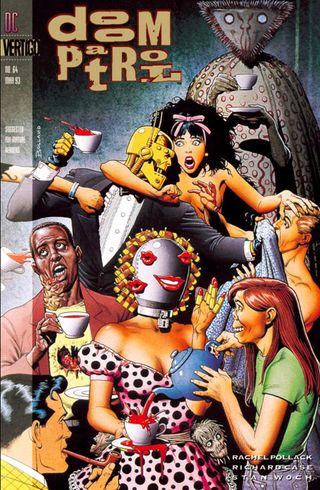
Nrama: Speaking of your Doom Patrol run - as a trans person myself I was really excited when I started getting into comics to have the chance to read your run, to see a trans superhero for the first time in Kate Godwin (Coagula). I think my favorite quote is, "I suspect they liked my powers, but couldn't handle me."
Pollack: The funny thing is that with Kate, the name 'Coagula' was kind of a joke. It was a name she used when she wanted to join the Justice League, you know? And it was never used again. There are a couple places they might have used it. But basically, she just used her own name like most of the other Doom Patrol members.
Niles Caulder was called Chief sometimes, but that was not a superhero name. Cliff was sometimes called Robotman, but in my run he was mostly just called Cliff. My whole thing was that these were people, rather than costumed characters.
Nrama: Right - and I liked that all of these folks were coming together as Kate, as someone who was interested in being a superhero but was rejected from the Justice League, and the whole team kind of coming together as this sort of found family, as a group of people that were both trying to get comfortable with themselves and trying to figure out sort of where they fit in a world that wanted superheroes that looked like different kinds of superheroes.
Pollack: Even more so, not even superheroes, it was just people who had a lot of trouble accepting their own bodies and their own existence. And so they were struggling a lot. In a lot of ways, I was very influenced by what Grant Morrison had done, and I felt like that was kind of the direction somewhat that they were going with, with some of those characters, questioning who they were in the world and stuff like that. And I just took it further. I made issue of people's bodies, and shame, and discomfort, the main issues.
When I introduced Kate, she became the kind of emotional center of the story. And really, to me she was kind of a logical extension of the fact that Grant Morrison had some kind of gender-crossing character in almost everything they wrote. There was always someone in drag, or a shaman who crossed gender, or whatever. And so I just took it further and had it be outright a transgender woman. I don't think people quite realized that - to me it was a logical extension of what Grant had done, and I think some people thought that was imposing stuff.
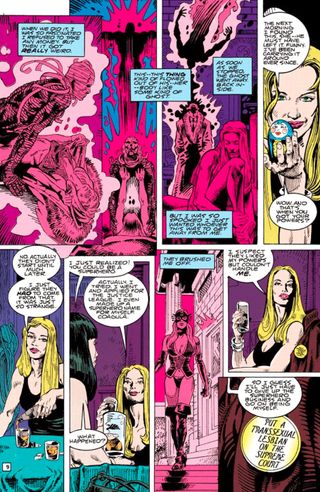
Nrama: I think the way that you talk about it makes sense to me as well. It seems a lot of times - most recently, the 'DC You' run of Batgirl had a villain in the first arc who was basically a drag performer, a man who was performing in this drag version of Batgirl to get her in trouble. I think when there was a bit of pushback to some of the language used in that a lot of people were like well, I didn't make that connection between these gender non-conforming or drag-adjacent characters, or storylines that could be about trans characters. Just because you didn't make the connection it doesn't mean the connection doesn't exist, it just means you hadn't seen it yet.
Pollack: At the same time, I mean one of my feelings is often that people believe they're supporting the trans community by saying how great drag queens are, and I find that really offensive. I imagine myself saying, 'Well, there's a really big difference between transgender women and drag queens.' Transgender women are women and drag queens are men. But of course that difference isn't always real, a lot of drag queens morph into trans women, because drag was the place where they could express who they were first. But in a certain sense you might say that 'real' drag queens have no interest in being women, they're interested in performance. And that's a big difference.
I was reading an article by a lesbian LGBT activist, and she was talking about how people opposed to LGBT people should get to know them, and for the 'T' part she said they should go to this great drag bar she knows about. And I thought, if she's going to be a spokesperson, you should learn about the people you're pretending to speak for. Trans people are not drag performers.
Nrama: I just clutched my chest - it's not the same! We're not the same. You can be a drag performer and be a trans person! You can be a drag performer and realize you're a trans person, but it's not the same. The idea that the overlap between those two groups of people is a perfect circle is really frustrating.
Pollack: It's just so interesting that people want to be champions of something but don't bother to find out what they're being champions of.
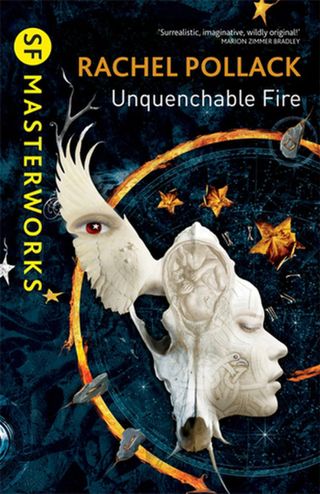
Nrama: Going back to some of your other work, one of the things I really like about your prose work is that they are oftentimes science fiction but heavily influenced by mysticism, by a knowledge of the tarot especially. You manage to blend those things in what is usually considered a 'rational' genre without making mysticism come across as weird or 'othered' which I think is something especially white science fiction writers have a lot of issues with. Do you find it difficult to blend those things? Is it kind of, those are your interests so that's what you're writing about, is it balance difficult to navigate as you started writing prose?
Pollack: I've always written prose since I was a kid, and as you said those are my interests, these are things I care about. To me, it's always important that the story is foremost. First thing, when I do a tarot reading for someone, in a sense what the tarot says is in that person's life is what matters, not all of the baggage. So to me, I'm always interested in just telling a good story. I guess people characterize my work as fantasy, although sometimes people have said my novel Unquenchable Fire for example is more science fiction because it created a coherent alternate reality that was worked out kind of systematically. So in that sense, it was science fiction, even though the science would be kind of magical shamanistic storytelling, rather than physics.
One reviewer who's a friend of mine, who was very warm to the book, at the same time he felt he had to say the revolution described in the book seemed to be a revolution to the laws of physics, which I thought was kind of cute.
So to me, I'm always interested in things that make good stories, that are not clichés. And I'm not interested in simply just borrowing something that's either logical or mystical or magical, any of the different kinds of structures that might be used. I'd rather use them as storyboards, springboards for stories. To me, that's what matters, rather than - but then, in my Jack Shade stories I've currently been doing, I just find it so much fun to take certain things that are traditional and magic, more magic than mysticism, and figure out what modern equivalents would be, you know?
So for example magic tradition in the West is elementals. Magic is animals that belong to the four elements. Salamanders for fire, undines for air. In my stories, everything is still an elemental. There's a computer elemental, a garbage elemental, a junk mail elemental, they're just all over the place. So the world is filled with elementals of one kind or another, and that's just fun to imagine, you know? How would the principle of elementals be enacted in our daily life. So there's now a selfie elemental that's invoked every time you take a picture of yourself with your phone.
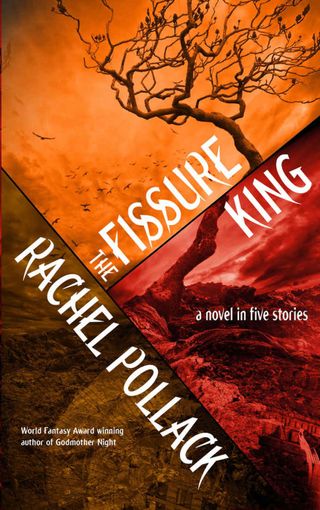
Nrama: You mentioned your Jack Shade novellas that you're working on. You've got a collection of Jack Shade novellas out this month, The Fissure King.
Pollack: Yes, October 10 is the official publication date. I had done the four stories and was looking to do the fifth one, an original one, that would tie all the threads together to round them out and make it a novel. And I couldn't quite think of what it was, and then a friend of mine who's a writer, Nancy Norbeck, she's also a great Doctor Who fan like me - more than me, really. We were discussing one of the episodes, and there was an alien referred to as the Fisher King, which is a term from King Arthur with the Holy Grail. She said the first time she heard it, in her mind she heard 'fissure,' and immediately in my mind it clicked with the whole concept.
One of the themes that runs through the Jack Shade stories is his daughter is trapped in this alien otherworld called the Forest of Souls, and he's trying to get her out and he can't do it. And I knew that the last story had to be about him rescuing her, and I didn't know how he was going to do that. And the term 'The Fissure King' instantly opened up the entire story to me, and completely cleared up how the story would work. I asked Nancy for permission to use the title in my way, and she was very gracious in that to say that was okay.
That comes out October 10, I'm very excited about it - it's my 40th book. It kind of snuck up on me. I was looking at my past stuff and noticed the Raziel Tarot was my 39th book. I said 'Wait a minute! The Fissure King is my fortieth book, wow.' That's a big number in the Kabbalah - in the Tree of Life, there are ten positions, and four worlds. Just like in tarot, there are four suits, and each suit has cards ace through ten, so forty's a big number in tarot as well.
Nrama: Your book, the Illustrated Guide to Tarot from '99, '00 -
Pollack: Right, The Complete Illustrated Guide.
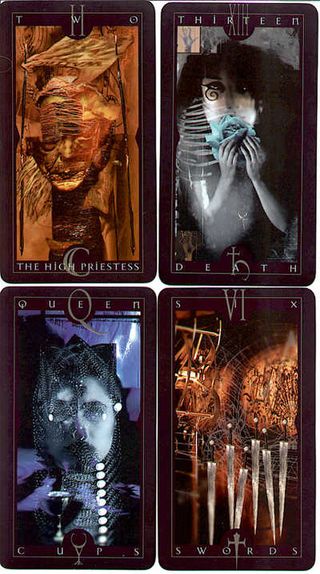
Nrama: I first started getting interested in tarot in college, and that was the book that I picked up. When I was getting ready for this interview I said 'It's the same Rachel, it's the same Rachel Pollack!'
Pollack: That's right!
Nrama: Have you incorporated any tarot elements into the Shade stories in a particular new way?
Pollack: Not really, I'm very careful about how much I used tarot in my fiction. I don't want people to think it's a tarot book, because then it gets put in a category where it won't be seen by people who might enjoy it. There's some tarot in Jack Shade, particularly in the final story, which includes his origin story, a kind of prologue. He has his tarot cards read at the circus, at a carnival, and it's very magical because two cards appear that don't actually exist in the deck. The tarot reader freaks out and kind of yells at him.
The whole thing about the Jack Shade stories is he's what's called a Traveller, and the Travellers are the oldest form of magical people. They exist in every culture. In the scene, he doesn't know this yet, but you see how he's being lead into this mysterious world. And fortune teller suddenly jumps up and she says, "Oh, no, you're one of them?" He says, "One of what?" She says, "A Traveller!"
He says, "What's that?" We know, because it's his story, and in the previous four we've been shown. But I'm very careful about how much I use tarot. I do use tarot to inspire stories, but often they're not in the story. I take a bunch of cards and see what kind of story they suggest to me.
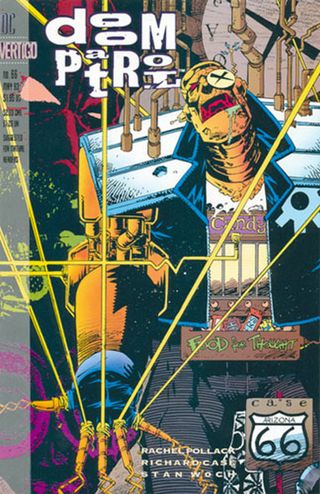
Nrama: I'm curious about that, do you read your own cards or just pull one or two and see where it takes you?
Pollack: I read my own cards. Sometimes I'll do just three cards, which is actually a spread, I'll do that. In a daily reading, I'll just turn over some cards. If I have a more serious question I'll do a more formalized reading. If I'm really kind of freaked out I might not do my cards, I might have someone else do them, because I'll be scared of what cards come up. I do read my own cards, most tarot readers do. There's a superstition that tarot readers never read their own cards, but in reality, almost every tarot reader does.
Nrama: That was why I asked, I think that was one of the first things I read when I started looking into tarot was "Don't read your own cards!" But what if I just want to practice? So that's interesting.
To go back to your work on Doom Patrol a little bit, speaking of things sort of sneaking up, your Doom Patrol run started over 20 years ago. How do you look back on your time on Doom Patrol, or on New Gods - just on that experience in comic books?
Pollack: I really love doing comics. I'm hoping to get back into it. It's the kind of writing I really like a lot. My writing is very visual anyway, when I think of a scene, I'm seeing something in front of me and I'm describing it. So it's easy. I've read comics all my life, it's kind of easy to do that for me. I love the way the kinds of things you can do in comics you can't do in any other medium.
I was always a little mixed. With Doom Patrol, it took me a while to really learn. It was the first comic I did. My first editor Tom Peyer, who happily has become a friend of mine over the years - at the same time, he let me roll with it. I probably could have used a sterner talking to. And then he went off and became a writer, and Lou Stathis and... Lou was really just wonderful. But one of the things he did was force me to be a little bit more coherent, and not just do this kind of Grant Morrison thing of filling the pages with bizarre strange things. Instead, having a coherent structure, and find ways for the readers to enter it. And then I became really happy with it, and felt like I was really doing something.
There was a lot of controversy about how a lot of people hated it, but I love the fact that 15 years after it ended someone on some fansite wrote how "Rachel Pollack is the worst writer in the history of the universe!" But I thought that was just great that someone was still so worked up about it. Other people said it saved their life, taught them how to live, gave them hope, because it was about something.
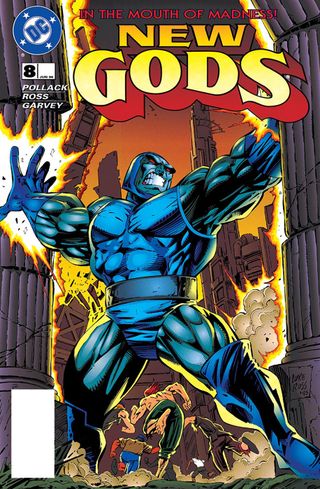
I love doing New Gods, because Jack Kirby was a great genius, and New Gods was his greatest work. I loved the idea of doing New Gods because I wanted to see them as 'New' gods rather than what I call 'superheroes on steroids.' Unfortunately, I was never wild and happy about the art, which I had no control over. DC was choosing the artist we used, and it was in sort of the 'tits and ass' period of comics, you know? Which I found offensive. What's the joke? I said I would have quit in protest if they hadn't fired me first. And they didn't fire me necessarily because of me, they fired me because John Byrne wanted to take it over. They fired the artist, me, the editor.
But I loved the chance to tell the stories I told. New Gods, I did one-shots, a couple of things, that was great. Vertigo had this thing at that point of taking obscure characters from the early DC periods, the '50s or so, and telling their stories in a radical new way. They asked which character I wanted to do, and oddly enough, immediately I thought of this character called Tomahawk. It was a comic I read as a kid, never one of my favorites - but I think there was a potential to tell this sort of Revolutionary War story from the point of view of the Indians, or rather, the point of view of a white person who became caught up in the dilemma of the Indians. The horrible ways in which the Europeans saw the Indians in the forest, and the fact that they saw everything as savage and evil that had to be conquered and destroyed, including the people. I was really very happy with that story.
I did a one-shot called The Geek, which is a character that Jack Kirby invented, but it didn't last very long. And then Neil Gaiman did a revision of it through the Alan Moore concept of elementals, and the Geek was the elemental of dolls. And then I took that further and made that story about the idea of abuse, and people who are trying to recover from abuse. There's a character called Dr. Abuse who was based on a story that someone in London told me once about a high-up British conservative politician who was a sadist, who never touched them, but who would have these young male prostitutes come.
My friend said this young man told the story about going to this guy's house, and all they did was have dinner and this guy talked to him. He never touched him, he never yelled at him or anything like that. And at the end of the dinner he showed him this bowl of large diamonds, and said, "Here, take one." It was his payment, it was worth a lot of money. And the kid - the rent boy - told my friend, "I hope I never, ever have to do that again." He said this man just looked at you and could cut right through your soul. The things he said would destroy you.
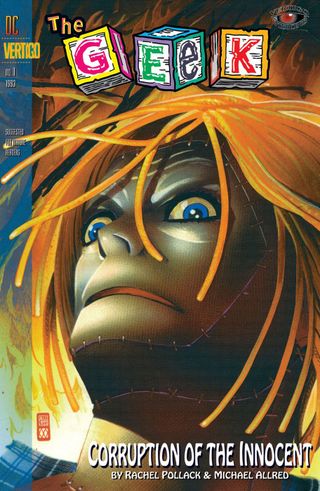
And that story just stayed in my life so powerfully, and that was the villain in The Geek. I called him Dr. Abuse.
Nrama: I imagine that would be so unsettling. I think a lot of people look at that situation and say, "Well, he didn't touch him." But to be stuck -
Pollack: Didn't touch him, didn't hit him, didn't scream at him. He just talked to him. But he saw right through him, you know? It's a scary idea, that someone could do that. It's almost like a superpower, you know? That politician was a supervillain in many ways.
Nrama: Talking to someone you can't get away from, who can be that piercing!
Pollack: The guy could have left, but he thought he should stick it out because that's what he was doing for that evening.
Nrama: You need the money! It's one of those choices. You can, but also ... can you really. Do you stay in touch with any of your other collaborators from Vertigo?
Pollack: Not really. I see Neil Gaiman very rarely, though we never collaborated - well, we did on the Vertigo Tarot. But now I get in touch with a few of the oldtimers, particularly Tom Peyer, a couple of other people. There are some people I would like to see again, I hope I get a chance to see again like Stuart Moore, who edited this time-travel series I did called Time Breakers. It was five issues, and it's now coming out in Italian. It's 20 years old! I thought that was nice.
Nrama: What was it like working under or -- having Axel Alonso as your editor back then, considering he's now editor-in-chief at Marvel?
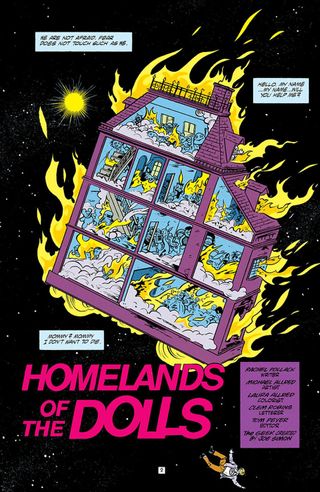
Pollack: That was at the very end of my run at Vertigo, and actually, Axel worked with Lou Stathis as an assistant, so I got to know him. And then Lou died and Axel kind of took over. Axel was a great guy, but he wasn't really interested in the kind of things that I and some other people were doing. He wanted to stay in a more realistic, grounded direction, so that was a little how I left Vertigo. Lou Stathis had been like my champion. My sales were not great. And Lou told me one time, he said, they were having a conference I guess the idea was put forward that they should discontinue what I was doing. And he said that he told them, 'If Vertigo can't publish Rachel Pollack, what's it for?'
What a great thing to say. And then sadly, Lou died. In my time at Vertigo he was a really great guy. So Axel and I - like I said, I have tremendous respect for Axel, but he was interested in doing very different things than I was doing. So that's kind of how my time at Vertigo came at an end. That and my bad sales. I shouldn't blame Axel, it was really my sales.
Nrama: I think that sensibility from Lou, being able to find writers that you're passionate about and championing them, is something Gerard Way has brought back now that he's curating Young Animal. Have you been in touch with Gerard Way at all?
Pollack: Gerard Way is great! He got in touch with me because he really wanted to work with the previous people who had written Doom Patrol, and respects their work. There's a chance I'll do some work for Young Animal - it's up in the air. But he's so damn busy and I'm busy too, we haven't really had a chance to look at that possibility. Joe Corralo's been in touch with him. There's a good chance! And he does want to bring back Kate, actually, which is very cool. I like that a lot and respect that. I'd do something like a one-shot for him, or a miniseries, it would really be great.
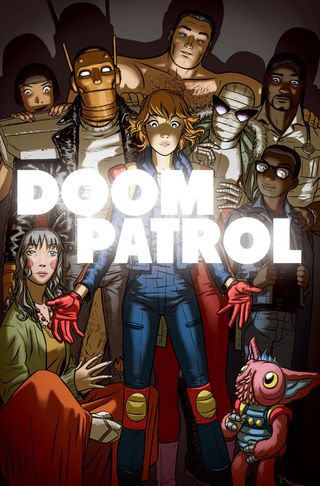
Nrama: If you were able to work on Young Animal, would you just be interested in working on Doom Patrol with Gerard, or -
Pollack: I wouldn't mind doing something! It's definitely his books. He knows what he's doing and I really like what he's doing. I don't know! It's based upon old DC characters, so that's a little limiting, but I can think of some characters I'd like to do. I don't want to say which. Joe asked if we could do another revival of The Geek, and I immediately thought, like, Dr. Abuse has returned as Donald Trump. So after the first story, his essence is banished, so it floats around and settles in President Trump. I don't know if they'd want to get that political but I think that would be really fun.
Nrama: I'd be interested in reading that.
Pollack: I think a lot of people would! It might get them in a lot of trouble. DC Comics has to be careful of lawsuits, and they have much bigger issues, being connected to television and movies now. They moved from New York City to Burbank. So, they'd probably be very cautious about doing something that could get their movie projects in trouble. But it's a nice idea!
Nrama: I feel like that's the kind of good trouble that John Lewis would be a fan of.
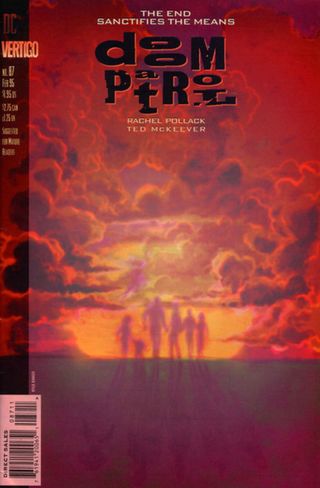
Pollack: I agree with you. I completely understand the need to keep the company going and not screw things up. One time I wanted to do this story - I wound up using this idea in a Jack Shade book - called "The Dead Quartet." And the Doom Patrol would fight the Dead Quartet. The Dead Quartet is these four beings who have been helping people. They're appearing to people to help them over the centuries. And the current configuration was going to be the Virgin Mary, Elvis Presley, Marilyn Monroe, and maybe James Dean. I think in the Jack Shade book it ended up being Nelson Mandela. The Virgin Mary was replaced by Joan of Arc.
But the idea would be that they got fed up with people not appreciating their help, and so they'd turn to nastiness and they're now villains and the Doom Patrol would have to be fighting them. DC said "No, we can't do that!" We can't offend the Catholic Church. And we certainly can't offend the Elvis Presley estate. Everything about Elvis Presley was trademarked, which is why sometimes you see these stories where he's called the King instead of Elvis Presley, because his name is trademarked.
I was really glad I was able to use that in The Fissure King, and no one could say, "no, no, we can't do that! We can't touch Elvis Presley!" Because Elvis is a good guy in my story. He comes and helps Jack out in Jack's greatest time of need - he just shows up in a pickup truck, Elvis from before he became famous. Jack's in a desperate state, and hears a on the door and Jack opens it up and it's young Elvis Presley. He says, "Hey, my truck's overheated, can I come and wait til it cools down? Maybe you've got some beer and peanut butter?"
They go sit in the kitchen, Jack's wife's body is on the floor, and Elvis is just talking to him. I was really so happy I could use the Dead Quartet, but I can understand DC's positioning. They're more visible and they have deeper pockets.
Many of Rachel Pollack's comic books are available digitally - so check out our list of the best digital comics readers for Android and iOS devices.
